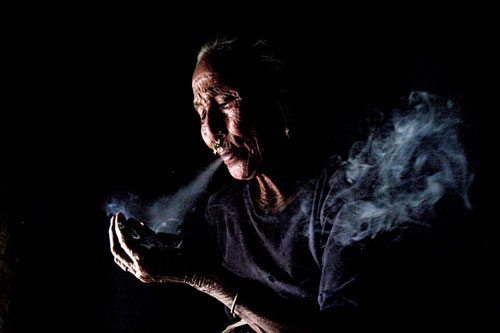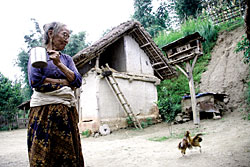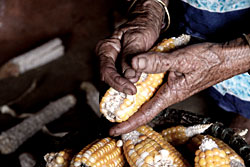 PICS: SUSHAN PRAJAPATI |
Raigaun, Muga is a very ordinary Nepali hill village, and the traveller may be forgiven for passing it by. This may be how it should be. The seasonal road, in the words of 75-year-old Lila Maya Rai, has made precious little difference to her life. 'I'd have to walk whether there was a road or not,' she says. 'We used to walk to Dhankuta, to Dharan, and even to Jogbani on the Indian side, which took three days. But since I hardly go anywhere these days, even to market, what do I care where the road goes or not?'
It is not entirely true that civilisation has passed Lila Maya by, even if she suggests the new, easy age of education and medicines and roads is not for her, this old woman of hard times. Just as her mother before her, Lila Maya had to bear the burden of a husband's early death, which left her with four daughters and a son. 'Babu, those were the hard days,' she remarks matter-of-factly. 'I even had to put my hand to the plough.'
Her calloused hands are as busy as ever. Shelling corncobs, drying the kernels in the yard. Herding her four cows with lusty shouts, cutting grass for her four goats. Cooking for her son, daughter-in-law and grandchild, washing dishes, chiding the neighbourhood kids. Chasing away the hornets that threaten her apiary-in-a-log. She is only at rest when she rolls herself a bidi and lights it. 'This is my friend.'
 |
But she's not let her prejudices keep her from essential treatment. She went down to Biratnagar a few years back to get some teeth replaced, then again for glasses. 'My teeth were all bad and cutting into my gums. Then I was seeing double, I'd chase one cow thinking it was two. So I went.'
Perhaps she would have made use of education, too, if she'd had the chance. 'The old man up the hill, he says, "We were born too early, sister!" We had to spend our lives in the dark. These kids,' she grimaces, gesturing at her seven-year-old grandson, Manish, 'they have to study, so they can't do anything else. They're smart, they know everything. But they don't even pick up what they drop, they don't cut one handful of grass.'
Lila Maya doesn't much fancy the chiplo luga either, the smooth clothes from India and China. She recalls with evident fondness the days of weaving, cutting and dyeing her own cloth. 'It was hard work and they didn't look so good, but they lasted,' she says, then eyes a crop-haired niece in shorts with distaste. 'Look at them, wearing pants, short hair. You can't tell men from women.' A brash, gravel-voiced boy of about 10 standing nearby sums it up. 'Sun chaadi hira moti dhoti'. Gold, silver, diamonds, pearls and saris, that's what grandma likes.
 |
'And now he wants to go abroad again.' She points at a photo of a youth in blinding sunlight against a backdrop of glittering towers. 'He said he couldn't stand the heat, he was sweating from the soles of his feet. Three years, and for what?' A television, a computer, a camera and a few thousand rupees. That's all he brought back from Dubai, what for?'
'I just got the things I always wanted,' Mani Raj admits when he and his wife join us after a day planting millet. 'I want to go back because there's nothing to do here.' Never mind that only last month a cousin came back in a coffin.
It is perhaps too much to expect Lila Maya to understand what her son wants away from home. For her, despite everything, 'Muga is like heaven,' it's home. She's not sentimental for the past, and has few desires, though when asked if she'd like to go live in Kathmandu, she's game.
'Why not?'
'But my days are gone,' she repeats with a laugh. She gets up, wry and spry, and waves a slipper on a stick at the hornet that just won't give up.
This article is excerpted from Hamra Hajurama: Our Grandmothers, a photo.circle project. A book launch and exhibition will take place at the Nepal Arts Council, Babar Mahal, on 18th December.
READ ALSO:
The land of my fathers - FROM ISSUE #470 (25 SEPT 2009 - 01 OCT 2009)
Empty, stately Thapagaun - FROM ISSUE #330 (05 JAN 2007 - 11 JAN 2007)


